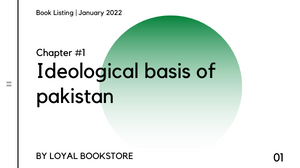Chapter1# Ideological Basis of Pakistan
Meaning of Ideology
Ideology represents the collective awareness of a group of people in a particular phase of history. Ideology holds people together and shows them a direction to move forward. Since the Muslims constitute overwhelming majority of the people of Pakistan, Islam forms the basis of the collective consciousness of the Pakistani people, which is called “Pakistan Ideology”.

Define the term Ideology
An ideology is a set of ideas and beliefs that are shared by a large group of people. Ideology forms the foundation of a political, cultural, social or economic system. The world’s people recognize a nation as a distinct entity based on its ideology.
Sources of Ideology:
Ideology is not formed in one day; it was formed after a long process of development and evolution. It cannot be implemented by executive order or imposed as a law. It has its roots in the history, traditions, customs and religion of a nation. These are the main sources of ideology.
Importance of Ideology:
All nations agree on certain basic principles and agree to abide by these principles. They set their objectives in the light of these principles. This set of principles constitutes its ideology. Ideology inspires the nation to advance with a sense of direction.
Pakistan Ideology Explained:
After the occupation of the British, the Muslims of India suffered a setback. The capable leadership of Sir Syed Ahmad Khan and later Allama Iqbal and Quaid-e-Azam Muhammad Ali Jinnah gave them a sense of new direction. Under the guidance of his leadership, the Muslims of India advanced in the light of their strong Islamic faith and succeeded in establishing an independent Muslim state, Pakistan. The initiative taken by the Muslims of independent India to achieve a Muslim state is called “Tehreek Pakistan” and the philosophy guiding this movement is called “Ideology of Pakistan”.
Fundamentals of Pakistan Ideology:
The ideology of Pakistan is formulated by Islam. The Islamic faith is based on two basic principles. Tawhid (Unity of God) and Rasool (Last Prophet Muhammad SAW) economic backwardness of Muslims. At first, Sir Syed’s efforts to spread modern education among Muslims had very limited effect. Most Muslims, under the influence of emotional leaders, dreamed of reviving the glorious Muslim past and ignored Sir Syed’s appeals to learn English and join modern educational institutions. The result was that Muslims were marginalized in all spheres of life.
They fell far behind the Hindus who had taken the lead in adopting the British educational system and entering the service of the British government. In the course of time, the Muslims completely lost their share in agriculture, industry and commerce. Leaders such as Quaid-e-Azam and Allama Iqbal believed that Muslims could not develop economically unless they were freed from Hindu exploitation and allowed to prosper in an atmosphere of political freedom.

Two Nation Theory:
Two Nation Theory means that there are two nations living in the subcontinent which are Hindus and Muslims. These two nations are totally different from each other on the basis of their customs, religions and social and moral values.
Sir Sayyad Ahmad Khan and the Two Nation Theory
Sir Syed Ahmad Khan (1817-1898) was the first to warn the British rulers that the British system of democracy was unsuitable for conditions in India. He argued that India’s two main nations, Hindus and Muslims, have different religious and cultural backgrounds. Sir Syed warned Muslims not to let their identity as a Muslim nation get lost in the multi-ethnic Indian identity.
They wanted the Muslims to appear as a separate and distinct nation. Sir Syed’s theory of a separate Muslim nationality, which later became the two-nation theory, succeeded in leading Muslims to achieve a homeland. This homeland was called “Pakistan” and therefore Sir Syed Ahmed Khan deserves to be the true initiator of the two-nation theory and the founder of the initiative that would later become the Pakistan Movement.
The Idea of Pakistan: Iqbal’s Statements
Iqbal’s struggle for the Muslim nation in India, his revolutionary poetry, and his philosophy of action and continuous effort made him a beloved leader of Indian Muslims. The salient points of Iqbal’s philosophy about Muslim nationality are as follows.
Muslim nationhood is based on Islam: Iqbal said that the binding force of Muslim nationhood into a single unit is not based on color, race or geography. It was based on faith and belief. He said:
“Islam is more than a religion. This is a community, a nation. ion.
Patriotism is an Islamic trait: Iqbal had always rejected the Congress concept of secular nationalism, so some critics accused Iqbal of being unpatriotic; denying it, he said:
Nationalism is part of the faith of Muslims in the sense of love of country and giving life for its honor. It comes into conflict with Islam only when it begins to play the role of political concepts and aspires to be the principle of humanity solidarity.
Ijtihad is a prerequisite for development: Iqbal believed that the scholars of the Muslim society should solve the problems arising in the modern age in the light of the Qur’an and Sunnah based on their enlightened decisions. Iqbal suggests that:
“The only path open to us is to take a respectful but independent attitude towards modern knowledge and appreciate the teachings of Islam in the light of this knowledge, even if we differ from those who have gone before us.”
The Islamic system is based on democracy and equality: Iqbal described the two basic principles of the Islamic constitution in the following words:
a) “Allah’s law is supreme. There is no place for authority (state authority) in the social structure of Islam except for the interpreter of the law.”
b) All members of the community have the right to be treated on terms of complete equality.
Muslim freedom is the only solution to India’s problems: Iqbal believed that if the nations of India remained at constant war with each other, they would destroy their entire cultural heritage. The economic conditions of your people will be unimaginably worse and they will not be able to take an honorable place in the community of nations. Subsequent events proved that Iqbal’s fears were correct. In his famous presidential speech at the Muslim League meeting in Allahabad in 1930, Iqbal said:
“The establishment of a strong Muslim state in northwestern India seems to be the ultimate goal of Muslims, at least in northwestern India.”
Solution of the Muslims’ Economic Problems lies in the Implementation Islamic Law: In a letter written to the Quaid-e-Azam on 28 May 1937, Iqbal expressed serious concern over the economic hardships of the Muslims of India. He said that the problem of economic distress of Muslims can be solved only by implementing the Islamic economic system. He believed that the political, economic and social system of Islam could flourish only in a free Muslim state.
Pakistan Ideology: Quaid-e-Azam’s Announcements:
Quaid-i-Azam did not see the Indian problem as communal. Instead, he believed that the problem was international in nature. The Congress leadership accused Muslims of being a reactionary class and accused the Quaid of being sectarian and sectarian. This accusation was stupid and unfair for a moderate and positive thinking politician like him. Pakistan’s Quaid-e-Azam’s demand was not based on Hindu hate sentiments. For years he worked hard for the two countries to reach mutually acceptable terms for a constitutional treaty, but Hindu extremists frustrated all his efforts in that direction. Quaid-e-Azam’s ideology on Pakistan and his views on Muslim nationality can be understood in light of the following summaries taken from his speeches and statements.
The Muslims will not accede to Hindu Domination: Addressing the historical 23rd March 1940 Muslim League session the Quaid-e-Azam made it clear:
“The Muslims of India will never join a constitutional scheme that results in Hindu supremacy in India.”
Muslims are a Separate Nation: The Quaid-e-Azam said:
“Islam and Hinduism are not religions in the strict sense of the word, but separate and distinct social orders, and it is a dream that Hindus and Muslims can form a common nationality. Hindus and Muslims belong to two different religions, philosophies, societies, customs and religions. They belong to two different civilizations based on fundamentally different ideas and concepts. Their lives and aspects of life are different. Uniting two such nations under one state must lead to disaster. Muslims are a nation by definition of any nation. Hence the need for a separate states where they can lead their lives according to their own values and religion.” Presidential Address, All India Muslim League Lahore Session, 22 March 1940.
Independent State; a Pre-requisite of the Muslim Progress:
The Quaid-e-Azam said:
“Muslims are a nation by any definition of a nation, and they should have their own homeland, their own territory and their own state. We want to live in peace and harmony with our neighbors as a sovereign and free nation. We want our people to develop their spiritual, cultural, economic, social, and political lives in such a way that we can
Think better and according to your ideals and according to the intelligence of your people” Presidential Address, Lahore Session of All India Muslim League, and 23 March 1940
Islam is the basis of our national unity, after the establishment of Pakistan, Quaid-i-Azam invited the nation to unite on the basis of brotherhood, he said:
“Islam has taught us this, and I think you will agree with me, whoever you are and wherever you are, you are a Muslim, you now belong to a nation, you belong to a region, a wide area has been formed, and that’s all. “Yours; It is not a Punjabi or a Sindhi or a Pathan or a Bengali, it is yours.”
Democracy, Equality and Justice: Foundations of Islamic Constitution: Explaining the guiding principles for the future constitution of Pakistan, Quaid-e-Azam said:
“Pakistan’s constitution has yet to be drafted by the Pakistani Constituent Assembly. I don’t know what the final form of the constitution will be, but I am sure it will be democratic in nature, incorporating the essential principles of Islam. They are as applicable in real life today as they were 1,330 years ago. Islam and its idealism have taught us democracy, it has taught us the equality of man, justice and fairness for all. We heirs our glorious traditions. Fully aware of their duties and responsibilities as architects of Pakistan’s future constitution”.
Sovereignty Belongs to Almighty Allah; Quran is the Source of Ultimate Guidance: Enlisting the guiding principles of an Islamic state the Quaid-e-Azam” said;
“Basically, in an Islamic state, all authority rests with Allah, the Islamic government functions according to the Quranic principles and rules. In an Islamic state, neither its head nor any parliament or institution or individual is absolutely can work on. Only Quranic injunctions govern our behavior in society and politics.”
Fighting Poverty and Exploitation; Our National Objective: Addressing the first Constituent Assembly of Pakistan the Quaid-e-Azam” observed:
“Now, if we want this great state of Pakistan to be happy and prosperous, we must focus all our attention on the welfare of the people, especially the people and the poor.”
Non-Muslim citizens are to be treated on the basis of equality. At the same meeting, Quaid-i-Azam announced the guiding principles of state policy and emphasized that the rights of non-Muslim minorities must be protected in the state of Pakistan. I will go Equal to the majority Muslim The leader said: You are free, you are free to go to your temples, and you are free to go to your mosques or any other place of worship in this state of Pakistan. No region, caste or creed has anything to do with state affairs.
